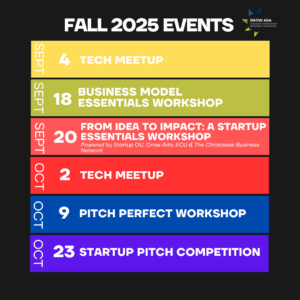
Exploring Data Democracy: Vinayak Mitty on AI, Machine Learning, and Empowering Businesses
December 6, 2024 by Ada Jobs

By: Sunnie Dawn Baker
A little over a year ago, I had the opportunity to sit down with Vinayak Mitty, the Director of Data Science for LegalShield. We discussed his path to data science and how machine learning and AI can transform industries. At the time, Mitty was also about to begin recording his own podcast, “Data Democracy,” that would delve further into these ideas. With the podcast now underway, I eagerly sat down with Mitty again to discuss his new venture and hear his thoughts about machine learning and AI.
So Mitty. I’m excited to hear more about your new podcast. Could you tell me a little bit about the main idea or purpose of it?
Sure. Data Democracy focuses on making data and AI more accessible to businesses of all sizes. I talk to executives and leaders across different industries and ask them about how they use data. In particular I want to understand how they use data to make their decisions and how they are using AI to make their businesses more successful.
How many episodes do you have so far? Are the subjects local?
So far, I have released seven episodes, featuring subjects from all across the globe. I have had people from Oklahoma, but also from Colorado, Los Angeles, the United Kingdom, and Ukraine.
It’s really cool that you’re able to get so many diverse perspectives. What’s your favorite thing about the podcast?
Well, I love how every industry uses data to make their decisions. And the wide array of guests has helped me learn how different industries and companies of varying sizes use and adopt data and AI. The guests come from all across the globe and represent a wide range of industries. Everything from CEOs to Venture Capitalists to Executives, from Leaders in Product, Marketing, PR, Construction, Defense, Healthcare and of course, Data and AI. It is great getting to learn so much from so many different people.
Do you have a long-term goal when it comes to the podcast?
My goal, eventually, is to publish a book about all the things I am learning from different people. I got that idea from one of my guests, Jim James. He turned his podcast into a book after 50 episodes and that is the direction that I want to be headed towards.
Who would enjoy this podcast? Who is your target audience?
Essentially, the audience is anybody who wants to learn about how to apply data, machine learning, and AI in their business or industry. There are so many different aspects to it. There are different metrics and approaches that leaders want to take versus managers versus employees. But machine learning and AI can be useful for every sector.
We are talking a lot about machine learning and AI, but can we take a step back for a moment and explain to our readers exactly what that means?
Oh of course! So to put it in basic terms, it is a kind of an evolution. It begins with creating data sets, like in an excel spreadsheet. The company just collects the data. But then the next step is learning how to automate the collection of that data. Then, when you want to create dashboards and reporting, it can go to machine learning which is essentially where the system analyzes the data for patterns and trends. Identifying cause and effect allows the system to model and predict the future. Like which customers are going to cancel a subscription. Or how to reach the ideal customer. The machine learning component untangles the data, enabling its use for future predictions.
Ok. So that’s machine learning but how is that different from AI?
Machine leaning helps analyze data, identify patterns and predict future events based on those patterns. But AI makes sense of it and allows the user to access it in different ways. A good example is an AI Data Assistant we built at LegalShield. Think ChatGPT, but just for LegalShield’s data! We used trained a Large Language Model (LLM) to just look at our internal data and answer questions about it. It won’t answer generic questions, just ones about LegalShield’s data. This is more conversational – our leaders and product teams can “talk” to it for easy and self serve analytics, go deeper than looking at dashboards, saving everyone time and effort.
So I know a lot of these technologies are integral for large companies. But can they be useful for small businesses or entrepreneurs?
Oh absolutely! Chat GPT, in a way, has democratized machine learning models for everyone. As long as a business owner has data, that data can be analyzed. Instead of taking seven years to come from excel spreadsheets to where we are now, these business owners can just leapfrog forward and have a large language model like Chat GPT analyze their data and provide useful insights that can make their companies more successful.
Where do you see these technologies moving in the future?
Well, it is very exciting. I think a lot about how in the 1800s people said they wanted faster horses. But they didn’t really want faster horses, they just wanted to go faster. And that led to the automobile. We don’t really know what the next paradigm shift will be, but we do know that AI can help with problem solving. For instance, when we have such big challenges like climate change, we can use all the help we can get. AI can contribute to that effort.
Written by
Ada Jobs
You may also interested in:

SIEGE AXE LOUNGE'S HIGH-TECH EDGE
BY: CATHLENA SPENCER When you think of axe throwing, you might picture wooden targets and painted bullseyes. Siege Axe Lounge, the 2nd Place winner in the Revenue-Generating category of Grow
A ROUNDPEG FOR A SQUARE PROBLEM
BY: CATHLENA SPENCER For many small business owners, the hardest part of the job isn’t serving customers- it’s the invisible battle with inventory. Knowing what to reorder, how much, and
FROM TRAUMA BAY TO TECH STARTUP: HOW TWO HEALTHCARE VETERANS LAUNCHED SOBER SALLY'S TO SAVE LIVES
BY: CATHLENA SPENCER In the world of entrepreneurship, necessity is the mother of invention. For Erin Ogee and Crystal Glass, the necessity was stopping drunk driving, a mission forged from
THE NEXT LEVEL: CONNECTING STUDENTS TO COLLEGIATE ESPORTS OPPORTUNITIES
BY: CATHLENA SPENCER On October 13th, Grow Ada hosted The Next Level: Esports Connect, a first-of-its-kind event in Ada that brought together collegiate esports coaches and community members to discuss
ADA COUGARS: BEYOND THE STARS
BY: CATHLENA SPENCER The future just got a whole lot brighter for the students of Ada Cougars: Beyond the Stars. The program, known for igniting passion and curiosity about aerospace
OKA' CAMP: A DAY OF WATER, WORDS, AND WISDOM
WATERSlumber, a desolate mind, trapped with thoughts of what is and what could have been. Awakened, but not by the beauty. A lust for power has gripped the heart of
GET READY TO GROW: YOUR GUIDE TO FALL INNOVATION WITH GROW ADA
BY: CATHLENA SPENCER Have you ever wondered how a good idea becomes a great business? This fall, Grow Ada is rolling out a series of events designed to be your
BUILDING FUTURES: WORK READY ADA CELEBRATES ITS FIRST YEAR
BY: CATHLENA SPENCER Just one year ago, Work Ready Ada, a new employment readiness program, was launched in partnership with Pontotoc Technology Center (PTC). The program, funded by Oklahoma Human
AI IN EDUCATION: A CONVERSATION WITH VINAYAK MITTY
BY: SUNNIE DAWN BAKER One of the areas in technology with the most potential for entrepreneurial growth is Artificial Intelligence (AI). AI is increasingly shaping every part of our lives,
Comments are closed.